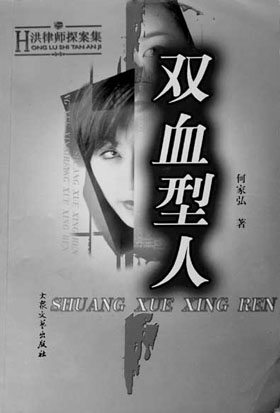Among the several authors engaged in writing detective stories in China, He
is probably the only one who has a legal background. This grants him an "expert
angle," which guarantees the credibility of his descriptions of crimes, law and
cracking cases.
|

He Jiahong's maiden novel "The Mad Woman" was
retitled "Double-Blood-Typed Person" (Shuang Xuexing Ren) by Dazhong
Publishing House. [China Daily]
|
He also
weaves his rich experience with the different strata of Chinese society into his
writing. The story of "Mad Woman" is set in Northeast China's Heilongjiang
Province, a place where he worked on a farm as an "educated youth" from 1969 to
1977, and the story of "Mysterious Ancient Painting" is set in Guangdong and
Hong Kong, where he stayed as a visiting scholar between October 1996 and March
1997.
Like many widely read detective novels, all of He's four books are in a
series with the same protagonist, Hong Jun, or "Master Hong." Considering the
social reality of China, and to make the story progress better, Hong is neither
a private detective nor a police officer, but a lawyer who strives to make sure
that justice prevails whatever the cost. This raises a different perspective on
cracking cases.
Hong's character, a Chinese man who returns from the United States, also
echoes He's own experience the professor got his doctoral degree at Northwestern
University in 1993.
Literary youth
For He Jiahong, detective writing is a way of fulfilling his young dream of
writing literature.
In his early 20s, he had never expected himself to become a law professor.
He was born in Beijing in 1953 and was sent to a farm in Heilongjiang in 1969
when he was only 16. A love for poetry was soon ignited within him, when he
published a few poems in literature publications and a local newspaper. Those
were largely "revolutionary poems" which were meant to inspire his fellow
"educated youths." He also wrote many poems that did not deal with revolution,
but those were never published.
In 1975 he decided to write a novel to record his experiences in
Heilongjiang. It took him more than two years, and contained about 300,000
Chinese characters.
After he returned to Beijing in 1977, he worked as a plumber at a
construction company but his enthusiasm for literature persisted. He visited
some experienced writers, sent his novel to them, and was told that it would be
better to begin with short stories.
He knew his novel was not good enough but he was not discouraged. He took the
advice of those writers and sent some short stories to literary publications,
but faced the same rejection.
With the end of the "cultural revolution" (1966-76), most things returned to
normal, and universities reopened.